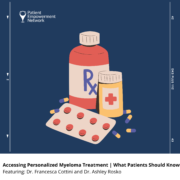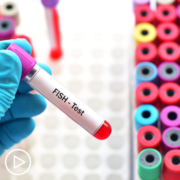Understanding Unique Barriers Faced by Myeloma Research Nurses
Understanding Unique Barriers Faced by Myeloma Research Nurses from Patient Empowerment Network on Vimeo.
What are some ways that myeloma research nurses overcome barriers? Expert Dr. Beth Faiman from Taussig Cancer Institute explains the vital role that research nurses serve as part of the multidisciplinary team for patients and how they overcome barriers.
Download Resource Guide|Descargar guía de recursos
Related Resources:

|

|

|
Transcript:
Dr. Nicole Rochester:
Dr. Faiman, can you speak to unforeseen or outdated practice-related barriers that may actually hinder the work of research nurses?
Dr. Beth Faiman:
Absolutely. So I want to preface this by saying in my mind. I think that both oncology nurses and advanced practice providers are highly trained professionals that should function within a multidisciplinary team. So that team, just as you mentioned before, Dr. Rochester, was the physician has limited time, maybe even the advanced practice provider has limited time. How can we harness all of our resources to provide the best care to that patient?
And clinical trials are one of them. Clinical trials will offer support so that the patient can have access to a pharmacist, a social worker, a dedicated nurse, a dedicated line to call if they’re having a symptom. But to speak to some of the outdated procedures, again, it goes to scope of the practice. No matter how highly trained they are experientially or with credentialing, there are practice barriers within the hospital organization within state laws.
The nice thing about clinical trials though, is that nurses in most institutions are very able to watch that clinical protocol. They’ll look for who needs to hold a medication because of toxicity, consult with the provider, and then they’ll say, “Okay, hold your dose. And when your toxicity resolves, reduce it one dose level, and come back for labs,” or whatever that would entail. So while there are outdated practices historically, I think that within clinical trials nursing it provides some more autonomy for oncology nurses, again, as a part of that multidisciplinary team to enhance patient care.




![[ACT]IVATED Myeloma Resource Guide for Veterans and First Responders](https://powerfulpatients.org/wp-content/uploads/ACTIVATED-Myeloma-Resource-Guide-for-Veterans-and-First-Responders-180x180.png)





